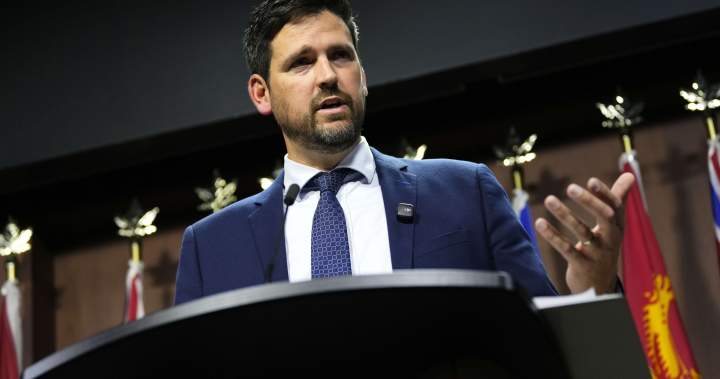The first document Central Nova MP Sean Fraser received after being sworn in as the minister responsible for Atlantic Canada’s regional economic development agency was a briefing binder, prepared by the agency’s bureaucrats, that boasted about its central role in sustaining the region’s economy, mostly by handing out more than $300 million in grants and loans.
The Atlantic Canada Opportunities Agency (ACOA) told Fraser that it boosted revenue and employment at whatever firm received an ACOA interest-free loan. All of the other six federal regional development agencies (RDA) made the same claim in briefing binders provided to their new ministers after the May swearing-in ceremony.
Combined, the seven RDAs provided $1.9 billion in grants and contributions in 2023-2024 to 70,000 businesses and non-profits across the country.
The impossible-to-ignore context of the information in the briefing binders provided to Fraser and the other six ministers in charge of a RDA was that all those handouts to businesses was money well spent and that their budgets ought to be spared from the order by Prime Minister Mark Carney to find across-the-board government savings.
“Our programs and services catalyze economic growth in the region,” each agency wrote to their new minister, using one of Carney’s favourite and most-used words — “catalyze” — three or four times in each minister’s briefing binder.
The government has been slowly releasing the briefing binders provided to every minister after their post-election swearing-in ceremony through the Open Government data portal. Binders for the RDA ministers were posted within the last week or so.

Get breaking National news
For news impacting Canada and around the world, sign up for breaking news alerts delivered directly to you when they happen.
ACOA (usually pronounced Ah-koah)¬Ý serves the four Atlantic provinces and there is one RDA each for the three northern territories, for Quebec, for southern Ontario, for northern Ontario, and for B.C. Manitoba, Saskatchewan and Alberta are served by Prairies Economic Development Canada or ‚ÄúPrairiesCan.‚Äù
Overall, RDA spending and projected spending has gone down since 2023-24 as certain one-time programs expired. For the most recent fiscal year, which ended March 31, the estimated budget for grants and interest-free loans distributed by RDAs came to to $1.4 billion. Spending for the current fiscal year, which ends March 31, 2026 is projected at $1.3 billion.
In their briefing binders, bureaucrats claim the support to small and medium-sized business in 2023-24 helped create or maintain 130,000 jobs.
Anticipating the criticism that those businesses which sought funding from federal taxpayers through the regional development agencies ought to have instead sought financing from a local bank,¬Ý RDA bureaucrats told each minister that: ‚ÄúCanadian [small businesses] face a high cost of borrowing and are often unable to take advantage of the economies of scale afforded to larger companies. This disproportionately impacts rural and remote locations, Indigenous communities, and individuals from underrepresented groups due to reduced access to supports and services.‚Äù
Since the spring election, regional economic development agencies have, to use a few examples, given a First Nations casino south of Edmonton $2 million to build a gas station and convenience store; provided a Saint-Quentin, N.B. brewery $37,500 to buy an automated canning system; paid $266,500 to a business in Mont-Blanc, Que. to install an outdoor slide at its tourist park; and gave a resort on Ontario’s Magnetewan River $202,500 to upgrade some cottages.
The bureaucrats argue that funding of those kinds of projects helps boost the revenue of its “client” businesses by 18.3 per cent versus non-clients and boosts employment by client businesses by 12.8 per cent versus non-clients.
The ACOA-specific briefing binder provided to Fraser cited StatsCan data to make the claim that “ACOA clients are more productive, generating $313,400 in sales per employees compared to $265,089 for non-clients.” Citing StatsCan again, it said workers in client businesses earn an average of $36.90 per hour versus $28.20 at “non-assisted firms.”
David Akin is the chief political correspondent for Global News
© 2025 Global News, a division of Corus Entertainment Inc.
Read the full article here














